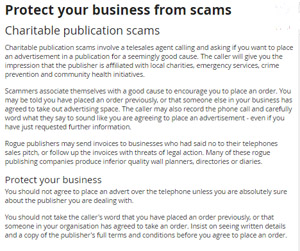Charitable Publication Scams
There's an unsettling trend where fraudsters, operating from various locations, employ unique methods to deceitfully acquire money. They pose as reputable agencies or officials, sending emails that appear legitimate. The unsuspecting recipient, when engaging with such emails, often becomes a victim, as the scammer extracts vital financial details from them.
Charity-related scams have been gaining traction globally. Impersonating representatives from esteemed charitable organizations, these fraudsters attempt to solicit funds from the public. They may go door-to-door with counterfeit subscription forms, convincing unsuspecting individuals to donate money that allegedly supports the underprivileged.

Moreover, scams involving fake charity shops are becoming more prevalent, especially in the USA.
Scammers approach small businesses like electrical, plumbing, or carpentry stores, offering them space
in 'charity publications' in exchange for donations. Social media platforms like Facebook are not immune
either, with numerous scams tricking users into donating money. Being well-informed can help people
avoid falling victim to these schemes. Here are some precautionary guidelines to consider:
- Avoid High-Pressure Tactics: Scammers may use aggressive strategies to procure funds. If you're under undue pressure, reconsider the authenticity of the charity.
- Verify the Terms: Authentic magazine companies will have transparent terms and conditions. It's essential to cross-check these before proceeding.
- Examine Receipts: Carefully go through any provided bill receipts. If you notice any discrepancies, consider reporting the issue to cybercrime units.

